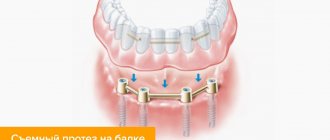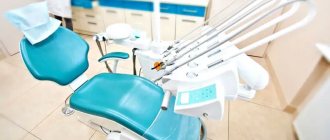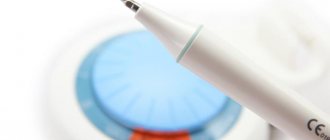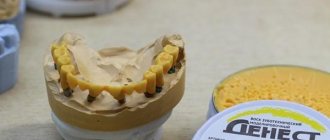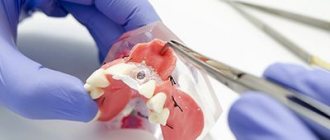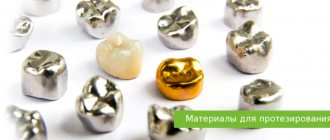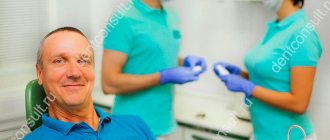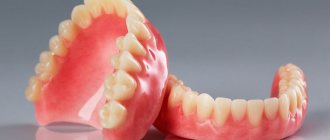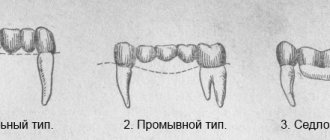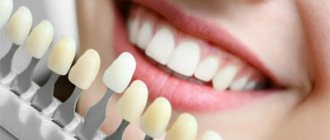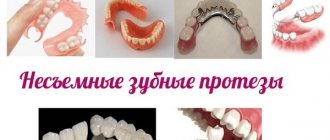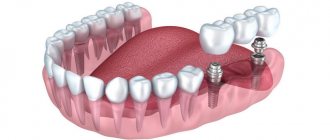What materials are dentures made from?
Today, dentists have a sufficient amount of materials for making dentures in their arsenal. Each of them is used for different purposes. Materials for dental crowns and dentures differ in cost, appearance and other characteristics, which allows you to choose a design identical to natural teeth. Since human health depends on the quality of products, strict requirements are imposed on materials for prosthetics:
- hypoallergenic;
- strength;
- non-toxic;
- lack of smell and taste;
- suitable color palette;
- compatibility with the tissues of the oral mucosa.
So, what materials are dentures made from? We invite you to familiarize yourself with the main modern materials for dental prosthetics.
- Plastic.
Temporary crowns and removable dentures are made from its varieties, since this material is short-lived, and after a couple of years the product has to be replaced with a new one. The most popular are affordable dentures made of acrylic and nylon. - Metal.
Cobalt-chromium, nickel-chromium and gold-containing alloys are widely used for dentures. They are used to make frames for crowns, clasp and solid metal structures without ceramic coating. - Zirconium oxide or dioxide.
Durable white material, ideal for making dentures for chewing teeth. To add a natural shine, zirconium dioxide crowns on the front teeth are often coated with a ceramic layer. - Ceramics.
In its properties, this material is closer than others to natural tooth enamel. It transmits light well and is easy to tint to the desired shade, so the color of dentures made from this material will be as natural as possible. The only disadvantage of ceramics is its lack of strength, but today a solution to this problem has been found in dentistry - the use of glass ceramics (lithium disilicate). Reliable and aesthetic modern E-Max crowns are made from it.
FRIOS opens the way for autogenous bone regeneration
Autogenous bone tissue from patients is still the “gold standard” for augmentation. And we think that's right. Therefore, in the FRIOS range we offer, with the help of the practice-tested operating instruments "FRIOS-OP" (" FRI ADENT O sseous Reconstruction System ") and with the help of the bone substitute "FRIOS Algipore", everything that is necessary for the reliable replacement of bone tissue defects: from bone harvesting through bone tissue transplantation and until successful bone tissue regeneration.
- "FRIOS MicroSaw" (according to Professor Khor) for minimally invasive bone tissue preparation
- "FRIOS BoneCollector" for collecting valuable vital bone chips
- "FRIOS BoneShields" for protective and formative coating of bone defects
- "FRIOS" membrane pins for secure fixation
- "FRIOS Unit S/i" device for augmentation and implantation surgery
- "FRIOS" straight and contra-angle handpieces for maximum freedom of action when preparing bone
- "FRIOS SinusSet" set for all preparation steps during sinus lift surgery using the open technique
The FRIOS product line, like all DENTSPLY Friadent Sirona products (Dentsply official website), are developed together with practicing physicians for practicing physicians. In the development of all these products, the focus is on simple and easy use: always for precise, successful and fast work.
What is the best material for prosthetics?
As you can see, the choice of modern materials for dentures is quite large. It is impossible to say definitively which material is better, since each is suitable for a specific purpose. For installing crowns on the front teeth, the best materials for dentures are ceramics, and for molars, metal-ceramics or zirconium oxide are more suitable. A specialist will help you choose which denture material is right for you.
Another important question is what is the compatibility of dentures made of different materials with oral tissues? According to medical research, the most biocompatible bases for artificial teeth are ceramics and zirconium dioxide. Such crowns never cause allergies, this is another big advantage.
Bone fixation
FRIOS BoneShields and Membrane Pins: To keep bone where it's supposed to be!
Fits, fits and stays in place – indispensable for successful augmentation is the fixation of bone plates and bone substitutes. "FRIOS BoneShields" exist . Particularly thin, laser-perforated, pure titanium membranes are easy to adapt and promote reliable fixation of bone material, support material for bone defect replacement, and are also important for rapid guided bone regeneration. At the same time, perforation allows good access of oxygen and supports the free migration of protective blood cells.
Depending on the defect, the attending physician can select the appropriate FRIOS BoneShields membrane. All BoneShields membranes have high mechanical stability and three-dimensional shape stability. This makes them superior to many other membranes.
For excellent membrane fixation, we offer the FRIOS FixationSet , in which everything is at hand: manuals for burs or for positioners, as well as for implant installation tools in order to quickly, simply and reliably fix the pins also located in the set for resorbable and non-resorbable membranes. In this way, the membranes are fixed so well that new bone cells can optimally be formed again because their supply and their protection are guaranteed.
FRIOS membrane pins are made of titanium alloy and gamma sterilized. Thus, they are absolutely biocompatible and suitable for any patient. This allows them to play a leading role worldwide in the field of membrane pin fixation, coupled with their universal application, high cost-effectiveness - unused membrane pins can simply be stored in a tray - and excellent durability. Pins are sold in a sterile package of 6 pieces. A holder for straight or angular titanium pins, a dental hammer, and a set of disposable cutters are purchased separately or as a set. The Frios pin for fixing membranes and titanium meshes can be purchased in our dental store Medicine for Life. The price indicated includes delivery. Frios pins and screws for fixing membranes. Bestseller. Moscow and all regions of the Russian Federation.
Prices for materials for dental prosthetics
Now you know what dentures are made of and what material to choose for dentures. It remains to find out what the price of materials for dental prosthetics is. The cost depends on factors such as strength, durability, aesthetics. Dentures made from ceramic or zirconium oxide will be the most expensive. Slightly lower than the price of metal ceramics. The most budget option is dentures made of plastic. They can also be used as a temporary solution to missing teeth.
| Material | Price |
| Ceramics | From 20,000 rubles |
| Zirconium oxide | From 30,000 rubles |
| Metal ceramics | From 18,000 rubles |
| Plastic | From 6,000 rubles |
Contraindications for installation
Absolute:
- infectious diseases (acute, chronic in the acute stage);
- non-infectious chronic pathologies (heart failure, diabetes, mental illness, oncology).
Relative:
- grinding of teeth, mainly at night (bruxism);
- pregnancy and lactation in women;
- diseases of the skeletal system (osteoporosis);
- malocclusion;
- oncological and precancerous diseases of the jaw;
- mechanisms implanted into the body (artificial heart pacemakers, spokes in bones after fractures, etc.).
Minuses
However, Friadent Xive implants also have relative disadvantages. All implants in this line are quite expensive. In addition, the cost of a crown or dental bridge must be added to this amount.
For some patients this will be a problem, but it can be solved by taking out an installment plan for implantation, that is, paying the amount in installments.
You may also have difficulty finding a specialist who works with this line, which is problematic precisely because of its high cost. But, nevertheless, finding a clinic that performs implantation using these implants is a feasible task.
Comparison of cost with analogues
| Implant name | Turnkey installation price in rub. | |
| with metal-ceramic crown | with zirconium crown | |
| Israel | ||
| AlphaBio | from 39000 | from 53000 |
| Mis | from 40000 | from 50000 |
| Germany | ||
| Ankylos | from 40000 | from 50000 |
| Impro | from 42000 | from 60000 |
| South Korea | ||
| Implantium | from 40000 | from 55000 |
| Osstem | from 43000 | from 65000 |
| Switzerland | ||
| Nobel Biocare | from 65000 | from 80000 |
| Straumann | from 77000 | from 90000 |
German XiVE dental implants: design features, model range, pros and cons
XiVE dental implants are a relatively popular German brand that only appeared on the market in 2000. However, it belongs to the large Dentsply Implants holding, which has specialized in the development and production of implant systems since the 60s of the last century. The company also produces dental implants from such well-known brands as Ankylos and Astra Tech. Despite the short history of the XiVE brand, the manufacturer has impressive experience and a good scientific and clinical base, which allows it to produce high-quality and reliable designs applicable in a wide variety of clinical cases. Today we’ll talk in more detail about the systems of this German brand, consider the popular models of the brand and the features of their use.
A few words about the manufacturer
The large holding company Dentsply Implants launched active production activities back in the 60s of the last century. The company was at the forefront of the development of detailed implantology and today is one of the undisputed leaders in its segment.
As mentioned above, the manufacturer is engaged in the development and production of dental implants of such famous brands as Ankylos and Astra Tech, and in 2000 it also introduced the world to a new brand of modern high-quality implant systems - XiVE. Product production is concentrated in Germany and meets all international quality and safety standards. The company is actively developing and implementing new technologies to improve the quality characteristics of manufactured implants.
pros
Advantages of the German Friadent Xive implant:
- Porous structure, due to which the implant healing time is reduced by 1.5-2 times.
- Instant loading of the implant is possible immediately after its installation.
- Using computer modeling, it is possible to predict the results of implantation.
- The implant is installed using special tools developed by the same company, so the whole process is quite quick and painless.
- Low risk of implant displacement at the beginning of the rehabilitation period, when it has not yet had time to fuse with the bone.
- A large selection of implants in the line allows you to choose the appropriate option for patients with a wide variety of structural features of the dentofacial apparatus.
In addition, there are no age restrictions for installation. It can be installed for any condition of the jawbone.
